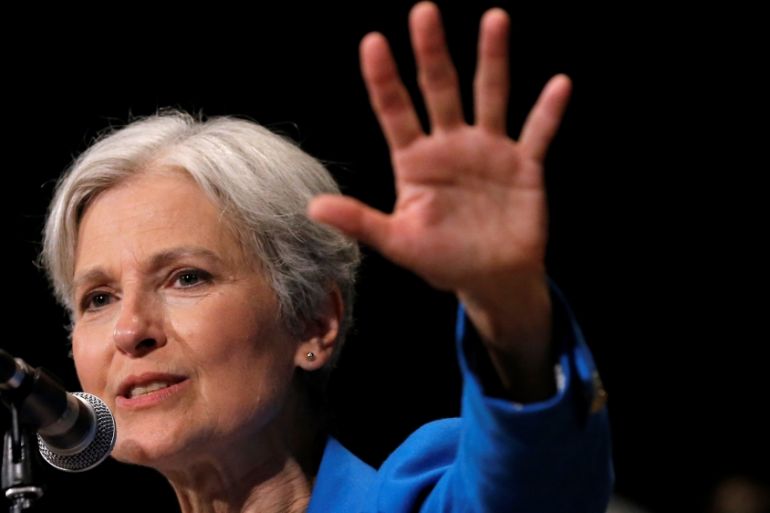For some on the US left, Green Party is a strategic vote
Some millennials hope the Green Party can fill the void where there is growing alienation with the two-party system.

Travelling across the United States over the past two months, the one recurring theme I found in every low-income community I visited was the feeling of abandonment.
This was true in Portland’s homeless camps, along the forgotten dirt roads of Native American reservations, the neglected towns in poverty-stricken Appalachia and the dilapidated border communities in southern Texas.
Keep reading
list of 4 itemsRuling HDZ party wins most seats, but no majority in Croatia election
Croatians vote in election pitting the PM against the country’s president
Solomon Islanders vote in election that could shape ties with China
Poor people feel that neither the Republican presidential hopeful nor the Democratic presidential candidate – one a billionaire, the other with a long record of coziness with Wall Street – have their best interests in mind, even if they find one less trustworthy than the other.
Against this backdrop of discontent and hopelessness, during a presidential election with two deeply unpopular mainstream candidates, pockets of progressive American millennials see a strategic opportunity in voting for the Green Party’s Jill Stein.
As bitter campaign rhetoric between Hillary Clinton and Donald Trump dominated mainstream media coverage, they hope the Green Party can step in and fill the void where there is growing alienation with the two-party system and America’s capitalism.
READ MORE: Jill Stein, Gary Johnson and ‘other candidates’
Sarah Levy, a 26-year-old member of the International Socialist Organisation (ISO) in Portland, Oregon, is among the growing number of Americans who reject the “lesser-evilism” binary that leads many progressive and left-leaning individuals to cast their ballot for the Democratic presidential candidate every four years.
“We have to acknowledge that the number-one reason why the left is so weak in this country is because of its continued allegiance to the Democratic Party,” Levy said. “We have to break from the two-party system – if we can do that, it’ll be a huge boost for social movements.”

Indeed, a 2015 Gallup poll found that 58 percent of Americans want to see a viable third-party option, and more than half of millennials – a loosely defined group aged between 18 and 29 – reject capitalism, according to a recent Harvard University study. A third of those surveyed said they support socialism.
Former Democratic candidate Bernie Sanders, a self-described socialist and senator from Vermont, eventually withdrew and threw his support behind Clinton – but not before opening the way for a franker public discussion of economic inequality and progressive policies.
But frustration with establishment politics hasn’t translated into more than 2 or 3 percent in the polls for Stein, who has faced harsh criticism from those both to the left and right of her.
“The status quo of student debt, increasing healthcare costs, rising tuition, stagnating wages, racist police brutality makes it harder for younger voters to believe the empty promises of the Democrats,” said Katie Feyh, a senior lecturer at Syracuse University.
“For several not-so-younger voters like myself, we’ve seen the rightward march of the Democrats and the kicking up of ever more horrific candidates on the far right for many election cycles now, and we’re not buying it any more either.”
For Feyh and many other leftists, the Green Party speaks to many issues that concern them, even if their political programmes don’t align precisely.
READ MORE: Feeling forgotten in America’s white county
Among the issues that have sparked sharp criticism from leftists is the ongoing carnage in Syria.
Stein’s vice-presidential candidate, Ajamu Baraka, is a vocal supporter of embattled Syrian President Bashar al-Assad, whose Russian- and Iranian-backed forces have been gripped in a blood-soaked civil war that has left hundreds of thousands dead throughout the past five years.
Baraka has also cast doubt on the United Nations investigation that concluded Assad’s government was behind the chemical weapons attacks that left more than 1,000 people dead in the Eastern Ghouta suburb of Damascus.
Others have criticised Stein’s investment portfolio, alleging hypocrisy over the shares she holds in many industries she speaks out against. Some have claimed she is anti-vaccines, a claim Stein, a physician, has rejected time and again.
From the centre, Stein’s critics accuse her of detracting potential Democratic Party voters – a claim repeated during most presidential elections – and effectively aiding the Trump campaign.
Those making these accusations usually place a special emphasis on third-party voters while exempting Democrats who don’t show up on election day from their criticism.
Kevin Hayes, a 31-year-old attorney who was raised in Texas and lives in Oregon, admits that Stein lacks the political charisma that characterised the Sanders campaign.
“My vote for Stein has significantly less to do with my favourable opinion of her than it has to do with my disgust with the so-called choice we’ve been given between Clinton and Trump,” he said, explaining that he doesn’t see the Green Party as working hard enough for disaffected members of the working class.
Despite these grievances, many of those casting their ballot for the Green Party see the 2016 election as an opportunity to secure millions of dollars in federal funding in the future.
By gaining at least 5 percent of the popular vote, the Green Party would be recognised as an official national political party and result in at least $8m to $10m in federal funding for the 2020 elections.
D Mazuz, a Portland State University student and ISO activist, says surpassing the 5 percent threshold would be “a very important victory” for progressives in the US.
“Not only would it provide greater material resources to project independent politics to the masses of exploited and oppressed people in the United States, but it would also symbolically legitimise the Green Party and force the political establishment to acknowledge independent left-wing politics as a part of the nation’s political life.”
Though the polls don’t suggest Stein will surpass this barrier and make history on Tuesday, the discontent with Democrats and Republicans highlights the huge potential for a third party to one day step in and fill the progressive void.
|
|